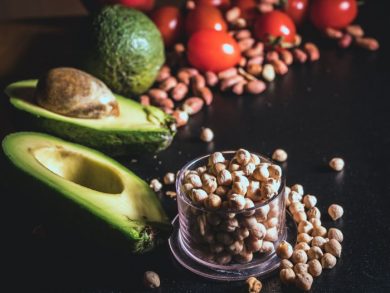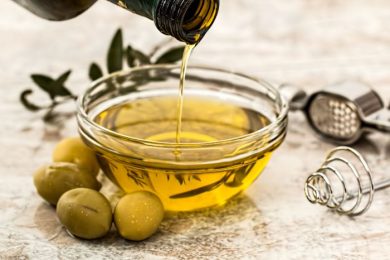
Let’s talk About Fat!
Fat was out of the picture for the better part of the 20th century due to the massive in-field study (Seven Countries Study) conducted by Ancel Keys. He investigated the dietary patterns of different countries, measured their blood pressure, collected blood samples and gathered other significant measurements. Finally, Ancel Keys concluded that dietary saturated fat is directly linked to the heart disease and should be avoided. Not long after, the American Heart Association implemented the recommendations to limit the saturated fat intake due to overwhelming proof of this all-encompassing study.
However, the society took these recommendations the wrong way and, instead of consuming more healthy fats coming from natural sources, people started eating more processed foods that became more abundant due to the food industry jumping in and embracing the “low fat” craze. Saturated fats were demonised and replaced with industrially processed trans-fats, that claimed to be more healthy and contained less calories. Low-fat margarines, cookies, pastries and other junk food could now claim that they’re healthy due to reduced saturated fat content. Recently, a meta-analysis (the study of studies) has been conducted and it concluded that the link of saturated fat intake and coronary heart disease is inconsistent.

INCONSISTENT. The mainstream media took this up as a green light for saturated fat. “Eat Butter” – the cover of the TIME magazine proclaimed. Despite the flawed study that has been absolutely invalidated since and had no significant conclusions, the damage was done and difficult to reverse! Well, so should you start eating extra butter? ABSOLUTELY NOT! The study of the studies that was inconclusive cannot reverse the profound scientific research that has been conducted for the past century and proven to be contrary to the majority of high fat fad claims. Unless you are following a strict high-fat diet, where all of your dietary fats come from high quality sources, there is no reason to start putting butter on everything you eat. Let’s talk fat! The fats in the typical western diet are significantly abused. In our predecessors’ diets the Omega 6 (pro-inflammatory) to Omega 3 (anti-inflammatory) ratio was close to 1:1. The current average of this ratio is ~15:1 (!).
We can clearly see that our dietary changes are not leading the society to healthier lifestyle, since the rates of obesity, heart disease and cancers have been skyrocketing in the past decade. Overconsumption of Omega 6 fats is making us more inflamed and promotes cardiovascular diseases, neurodegenerative diseases and cancer. If one decides to increase their fat intake, it is important to take educated decisions, based on research that does not come up on the cover page of the Time magazine. Not all fat is bad, right? Correct! However, there is one fat that we should steer absolutely clear of – trans fat. It raises our bad (LDL) cholesterol and lowers our good (HDL) cholesterol levels and is barely found in natural foods.
In 2015, Food and Drug Administration (FDA) ruled trans fats as UNSAFE to consume. Unsafe! In order for such a big regulatory body as FDA to proclaim that something is not safe to eat, there has to be some overwhelming evidence on how trans fats are detrimental to our health. As for saturated fats, the current recommendation from the American Heart Association states that under 7% of your daily caloric intake should come from saturated fats (it is a very controversial recommendation in the medical community). Are you confused? You’re not alone! So what fats should you eat? Let’s put it simply – go for naturally occurring fats that are found in nuts, such as walnuts, macadamia nuts, almonds, pistachios; seeds such as pumpkin, sunflower or chia; indulge in fatty whole foods like avocados, grass-fed beef or pasture-raised eggs.
If you are looking for a reliable oil to cook with, go for a high quality olive oil or avocado oil. You can also include a moderate amount of coconut oil for baking and dowse your salads in extra virgin olive oil, since most nutrients in vegetables are fat-soluble and adding extra virgin olive oil to your salad will help your body to absorb them. Other oils, such as soy, rapeseed, sunflower or vegetable oils are highly refined, causing inflammation in your brain and body, and do not promote healthy lifestyle. Lately, fat has been one of the most controversial topics in the field of nutrition. With the rise of the ketogenic diet, high-fat approach has received a lot of attention from the mainstream media and weight loss practitioners. By no means should one state that there is no place for the ketogenic diet in anyone’s lifestyle.
There is enough anecdotal evidence that shows how the ketogenic diet assisted with controlling cases of type 1 diabetes and reversing type 2 diabetes, the ketogenic diet (when done right) can also promote sustainable weight loss. However, the ketogenic diet is difficult to incorporate, hardly sustainable and, subjectively, lacking of more complex, flavourful foods. On the other hand, there’s plenty of scientific research on how plantbased diet reverses type 2 diabetes, heart disease and certain cancers. It seems like the field of nutrition is divided into two camps, high-fat lowcarb proponents and low-fat high-carb supporters, with nothing in between.
Rather than chasing low-fat or low-carb fads and overthinking daily food choices, it is easier to stick to the whole foods that do not claim their “health benefits” on their eye-catching labels, but rather resemble real foods in the first place. As Michael Pollan cleverly wrote in his book “In Defense of Food”, “Yet as a general rule it’s a whole lot easier to slap a health claim on a box of sugary cereal than on a raw potato or a carrot, with the perverse result that the most healthful foods in the supermarket sit there quietly in the produce section, silent as stroke victims, while a few aisles over in cereal the Cocoa Puffs and Lucky Charms are screaming their newfound ‘wholegrain goodness’ to the rafters.” Most people take fat, or lipids, too generally, assuming that fat is just a macronutrient that is going to make them overweight.

Fortunately, it is way more complicated than that! Fat is essential to our daily diets, however due to a lot of conflicting information and influence of big industries it is challenging to know which fats are beneficial for you. If you would like to dive deeper into the world of fats and educate yourself on what is what, hang in there with me. There are two general types of fats: saturated fats and unsaturated fats. Going further, unsaturated fats are broken down into three subcategories: Monounsaturated fats, Polyunsaturated fats and Trans fats.
Saturated fats usually stay solid at room temperature and have high melting points, meaning that heating them in high temperatures does not affect their nutritional benefits. Some foods rich in saturated fats are: eggs, beef, coconut oil, cheese, butter and pork. Monounsaturated fats are liquid at room temperature and have lower melting points. Main foods that contain monounsaturated fats are avocados, nuts and seeds and olive oil. These fats are usually considered to be the healthiest ones to consume.
Polyunsaturated fats are liquid at room temperature and get solid when kept in lower temperatures. They are classified by four different Omega Fatty Acids (3, 6, 7, 9). As mentioned before, Omega 3s are anti-inflammatory and are found in foods like salmon, walnuts and flaxseeds, whereas Omega 6s are pro-inflammatory and can be found in salad dressings, fried foods and lower quality grain-fed beef. Polyunsaturated fats are also healthy to consume, while keeping Omega 6 to Omega 3 ratio of 4:1 and under. Trans fats. There are two types of trans fats – natural and artificial.
Natural trans fats are found in very small amounts (<3%) in dairy products, beef and pork and are not harmful if consumed in moderate quantities. Conversely, artificial trans fats are highly processed through the process called hydrogenation and even small amounts can be harmful. They raise our “bad cholesterol” (LDL) levels and lower “good cholesterol” (HDL) levels, damage our gut lining and increase the risk of heart disease and diabetes. Trans fats are sneaky, so read your labels and avoid anything that says “partially hydrogenated oil” on it.
Why do we even need to consume dietary fats? Well, first of all, dietary fat holds more energy per gram than any other macronutrient (9 calories, comparing to 4 calories, provided by 1gm of carbohydrates or proteins) and it is more efficiently delivered to our cells, avoiding insulin spikes. Secondly, our brain tissue is mostly made of fat and dietary fat is necessary to fuel our brain. Another reason, why we need to consume dietary fat is that human’s body does not synthesise essential fatty acids by itself, therefore it is necessary to acquire them from dietary sources in order to support basic bodily functions. The bottom line is – in order to maximise your health, regardless of how much dietary fat you consume, you should go for quality fats coming from natural sources, while trying to completely eliminate trans fats from your diet!



